actually, #5 is just about me. At one point I started to feel so insecure and not self-conscious anymore and now I have a feeling everything is / or should do just the same
Why a Person May Project Their Insecurities Onto Others, and How to Prevent Them From Hurting You
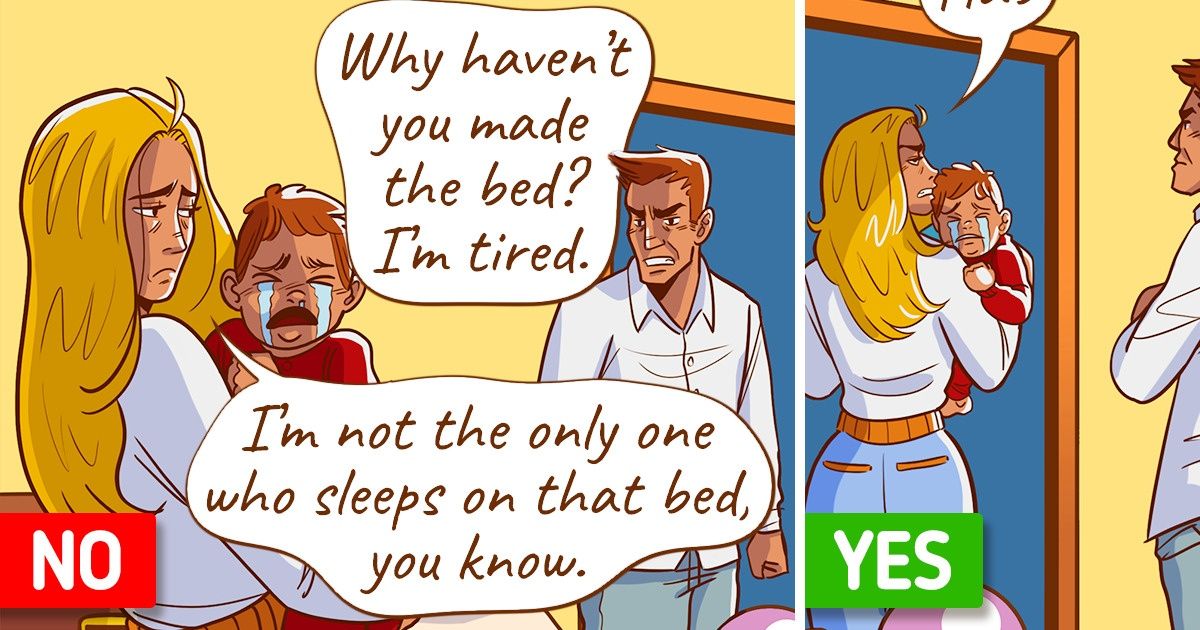
Although we may not be fully aware of it, our minds are capable of protecting things in situations that affect us emotionally; and one of these defense mechanisms is psychological projection. The truth is it can be harmful in our relationships since it usually ends up hurting someone or making the other person feel guilty without realizing it, and sometimes it’s not even true and/or fair, so we have to do our best to keep these attitudes at bay.
Bright Side wants to raise awareness about psychological projection in everyday life with the intention of giving people some tools to detect it before it causes more harm. This way, we can avoid becoming victims of people who are projecting, or even recognize it in ourselves, and try to change the behavior.
Psychological projection as a defense mechanism
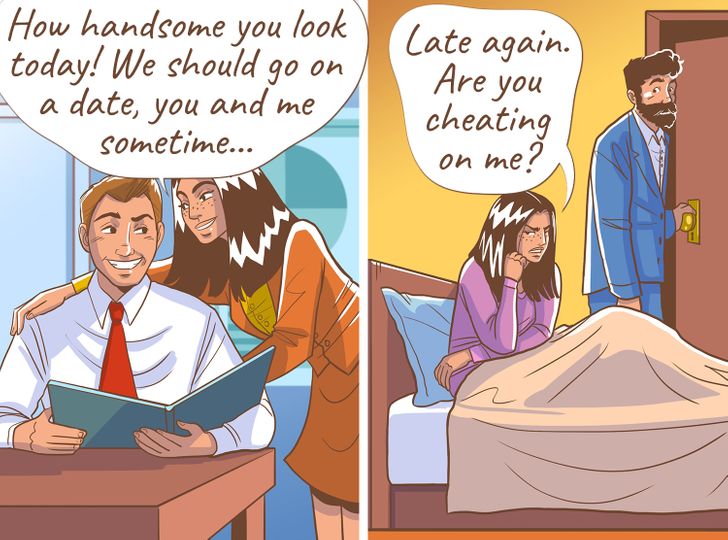
When a person cannot accept certain traits, qualities, desires, or impulses in themselves, then they might actually proceed to project these onto others. For them, it will seem like it’s the other person who suffers from the qualities that they as “projectors” don’t like. This is, in fact, a fairly common way of dealing with things. After all, projecting yourself onto others is a self-defense mechanism. It can sometimes help people deal with types of discomfort or even shame that remain subconscious and that you don’t want to face. If you look at it closely, it’s actually a way for a person to deal with a difficult trait, just without realizing it’s their own problem.
Now that we have that background information, we can ask ourselves what we actually do to protect ourselves at times when we project ourselves onto others. The answer is simple: generally, it’s all about self-esteem and ego. That is, it takes an ego that is too solid to hide any kind of “bad or dark side” in oneself. Deep down, these types of people assert, in their minds, that negative feelings, thoughts, and behaviors make you inferior, so they hide them.
Some ways people can project themselves in everyday life
1. They blame others and refuse to take responsibility for their actions.

This is probably the most common way of projecting fears and insecurities onto others. The person who projects avoids recognizing the blame for a given situation and looks for reasons to attribute it to someone else. Generally, projection situations are based precisely on demonstrating the idea of: “It’s your fault, not mine.”
2. They find “flaws” in others and tend to judge them.
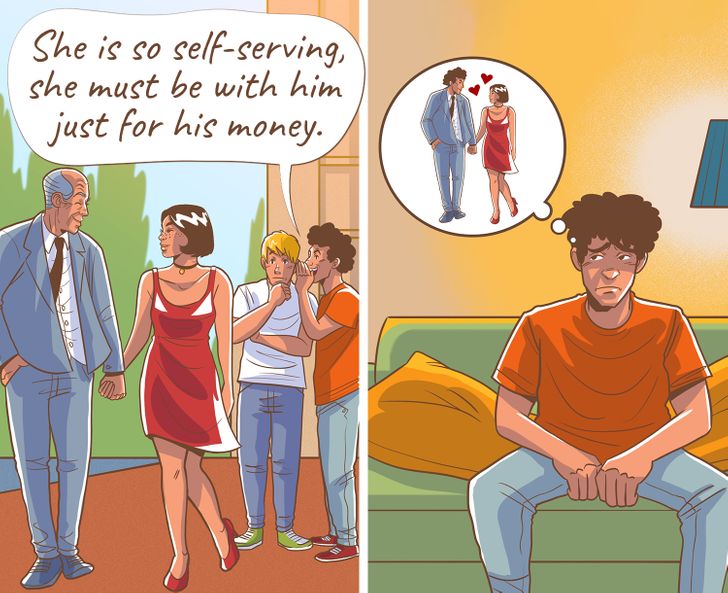
For a person who commonly projects him or herself onto others, it is much easier to attack and make other people think that they’re displaying behavior instead of actually confronting the problem themselves. This is why it’s often said that the way a “projector” acts toward another person may reflect how he or she really feels about him or herself in a specific situation.
3. They try to mock others.
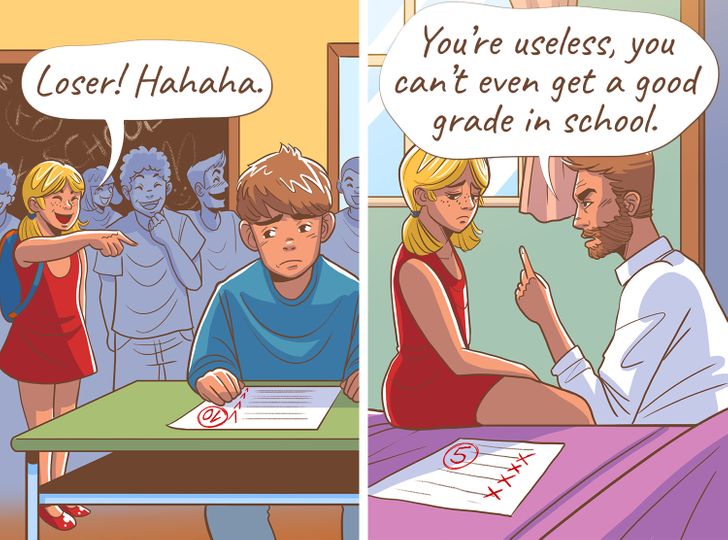
4. They convince others that their projections are real.

The worst-case scenario, in terms of psychological projection, takes place when a person who keeps feeding his or her projections manages to incorporate these into the identity of the subject on whom he/she is projecting. For Darlene Lancer, a specialist in toxic relationships, the profiles that are prone to falling for these types of psychological problems are people who show signs of codependency. To put it in simple terms, these are people who show excessive concern for others, and in the particular case we’re talking about, they are concerned for the person who projects onto them and makes criticisms about it.
Codependents tend to accept or put the needs of other people first, so they indulge them with the intention of avoiding any type of conflict that could arise from facing the real issue behind their relationship. In this way, the projecting subject makes criticisms and judgments about a codependent person who, as a result, loses self-esteem and independence to the point of sowing doubts in his or her mind about who they are and how much they’re worth. Thus, their identity becomes blurred until they end up believing everything that the other person projects on them, and this is what psychologists call “projective identification,” meaning that they end up identifying with what the other person projects onto them.
5. They judge themselves and are “sure” that others do the same.

It’s also possible for a codependent person or someone who suffers from low self-esteem to constantly criticize themselves harshly. This might happen a lot, up to the point of feeling that the very same weaknesses they see in themselves can also be seen and judged by others. In that way, they’re actually projecting their insecurity onto others.
6. They transfer to one person the perception they have of someone else.
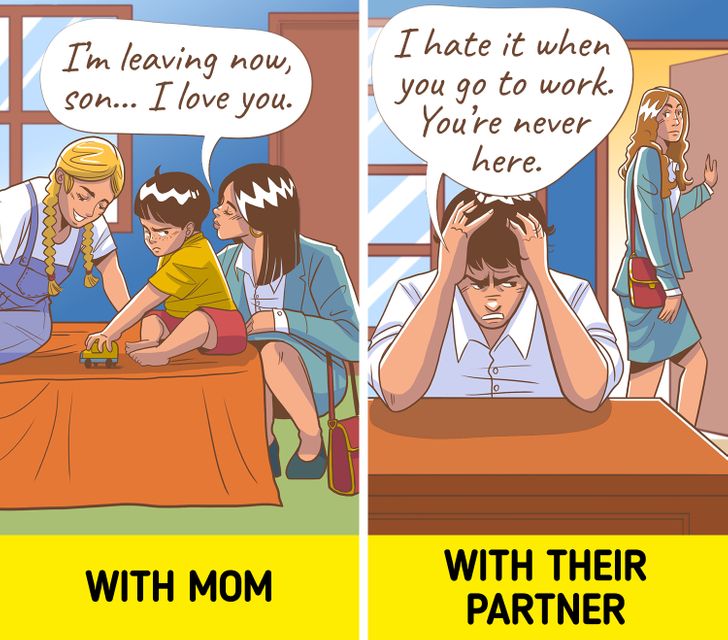
This situation commonly arises in romantic relationships in which the subconscious feelings that the “projector” feels towards the father or mother are transferred to their partner, and he or she, in turn, assumes them as their own. In other words, the person, these feelings are projected onto, takes on the role that the “projector” felt for a person in their past in a situation that was impossible for them to really handle or get an understanding of. Signs of this type of projection are:
- Having the same fight over and over again
- Feeling upset with their partner without knowing why
- Confusion about their partner’s reaction to a situation
How to know if you are projecting

If you identified with any of these situations, it’s likely that you are in a relationship in which there is psychological projection. Projection affects self-knowledge and self-recognition, so a person who is not able to recognize and accept his or her weaknesses can easily find themselves projecting them onto others.
That’s why it’s so important to raise awareness about this psychological mechanism if you want to deal with the underlying issue. Part of the process is also to become aware of ourselves, our thoughts, actions, emotions, reactions, etc. Questioning yourself is always the first step to knowing if it’s possible that you have exerted some kind of unconscious projection onto others.
How to know if someone’s projecting onto you

If, on the other hand, you identified yourself as the object of someone’s projection, it is important for you to know that there are certain signs that will help you detect if you are facing a person who is projecting onto you, such as:
- Their judgments are exaggerated or do not fit the situation.
- He or she has a strong reaction that is unusual to something you said about them.
- There seems to be no reasonable explanation for their reaction.
- The person redirects the conversation to you or someone else.
How to act if someone’s projecting onto you
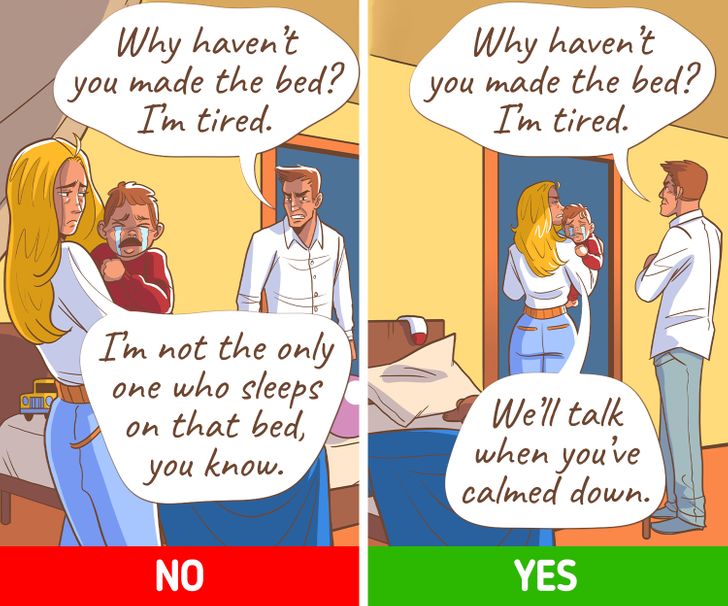
In the event of having to take action, like when facing someone who’s projecting, the ideal thing to do is respond clearly without entering into major conflicts. You can respond with, “I do not agree,” or even withdraw from the conversation when the subject doesn’t stop the conflict even though you don’t play along. The important thing is to prevent yourself from internalizing those unfair criticisms or blames, preparing yourself with the idea that what these people are saying is actually not personal and that it’s not you, it’s them.
After the discussion and with “cooler heads,” you can try to talk about his or her actions, but without setting the goal of making him or her change. After all, that is not your obligation, and this type of person usually requires psychological help to achieve such a transformation.
What to do if you are projecting onto someone

If you believe that you are the one who is projecting, it’s advisable to move away from the problem and then calm down to establish the situation objectively in 4 steps:
- Describe the situation that happened without using adjectives or words that express emotions of any kind.
- Describe your role in the situation. “What could I have done on purpose or unintentionally that triggered the other person’s reaction?” or “What does it say about me if what has been said is true?”
- Describe the other person’s role in the situation, avoiding adjectives. “What stories am I telling about the other person’s behavior?” or “Is there evidence that I am right?” If so, “How does it affect me?”
- Can you recognize when you’re projecting?
It’s worth mentioning the most important point: for both situations, the best option will always be to consult with therapy specialists.
Have you ever witnessed a situation of psychological projection? How did you deal with it?
Comments
my best friend is just like this too - when she wins she is happy, but she hates loosing and then would accuse anyone or even quit the game
Related Reads
I Helped a Friend Have a Child — Now He Wants a Relationship I Never Agreed To

18 Stories That Prove Kindness Can Come From the Most Unexpected Places

17 Times Kindness Helped People Get Back on Their Feet

I Refused to Drop Everything for My Pregnant DIL — and She Made It Personal

12 Unexpected Acts of Kindness That Finally Forged Love in These Blended Families

15 Stepparents Who Earned Their Stepchildren’s Love in Unexpected Ways
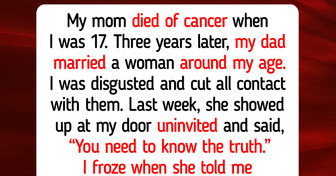
My Cousin Uninvited Me to Save Money—My Petty Revenge Was Absolutely Worth It

12 Stepchildren Who Finally Let Their Stepparents In

12 Stories That Prove Real Kindness Is About Actions, Not Words

I Refused to Pay for My 80-Year-Old Nana’s Medical Bills—My Kindness Meant Nothing to Her

15+ People Who Just Went for a Walk and Found an Adventure
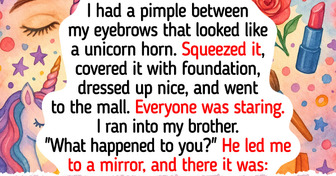
I Refuse to Let a Strange Lady Touch My Rare Birthmark for "Good Luck"—Now I’m Being Threatened
